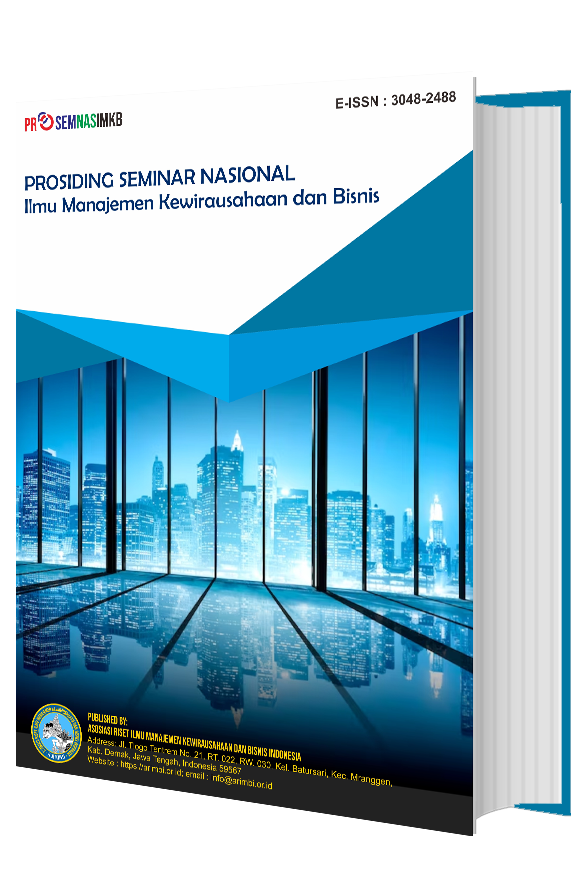Mengapa Generasi Z di Bogor Memilih QRIS Tinjauan dari Gaya Hidup hingga Sikap Keuangan
DOI:
https://doi.org/10.61132/prosemnasimkb.v2i2.230Keywords:
Belief, Ease of Use, Financial Attitude, Lifestyle, Usage DecisionsAbstract
Digital transformation in Indonesia's financial sector has accelerated the adoption of cashless payment systems, with QRIS (Quick Response Code Indonesian Standard) as the main innovation since its introduction by Bank Indonesia in 2019. Generation Z, as a digital native group, is the dominant user of QRIS due to their preference for fast, practical, and connected services. This study aims to empirically analyze the influence of lifestyle, ease of use, trust, and financial attitudes on the decision to use QRIS by Generation Z in Bogor Regency, as well as test the role of financial literacy as a moderation variable. The research approach uses quantitative methods through inferential statistical analysis. The results showed that only the variables of ease of use and financial attitude had a significant effect on the decision to use QRIS, with a significance value of < 0.05 and t calculated > t table. These findings reinforce the Technology Acceptance Model (TAM) model, which emphasizes the importance of the perception of convenience in driving the adoption of digital payment technology. Meanwhile, the variables of lifestyle and trust did not have a significant effect, which may be due to the level of general trust that has been formed in QRIS and the digital lifestyle of respondents who have not fully developed. These results confirm the need to develop a more intuitive user experience and increase education related to digital financial literacy to strengthen the sustainable use of QRIS among Generation Z.
Downloads
References
Adinda, M. (2022). Analisis faktor-faktor yang mempengaruhi Gen Z dalam penggunaan Quick Response Code Indonesian Standard (QRIS) sebagai teknologi pembayaran digital. Contemporary Studies in Economic, Finance and Banking, 1(1), 167–176. https://doi.org/10.21776/csefb.2022.01.1.14
Aggarwal, K., Malik, S., Mishra, D. K., & Paul, D. (2021). Moving from cash to cashless economy: Toward digital India. Journal of Asian Finance, Economics and Business, 8(4), 43-54. https://doi.org/10.13106/jafeb.2021.vol8.no4.0043
Alalwan, A. A., Dwivedi, Y. K., & Rana, N. P. (2018). Digital banking adoption: A qualitative study. Journal of Retailing and Consumer Services, 44, 169-176. https://doi.org/10.1016/j.jretconser.2018.06.002
Chen, H., & Volpe, R. P. (2019). Gender differences in personal financial literacy among college students. Financial Services Review, 11(3), 289-307. https://doi.org/10.1016/j.fsr.2019.03.001
Davis, F. D. (1989). Perceived usefulness, perceived ease of use, and user acceptance of information technology. MIS Quarterly, 13(3), 319-340. https://doi.org/10.2307/249008
Gefen, D., Karahanna, E., & Straub, D. W. (2019). Trust and TAM in online shopping: An integrated model. MIS Quarterly, 27(1), 51-90. https://doi.org/10.2307/3250959
Harahap, R. A., & Zoraya, I. (2024). The influence of perceived ease of use, usefulness, and security on Gen Z’s interest in using QRIS as a payment method. Formosa Journal of Applied Sciences, 3(3), 8407. https://doi.org/10.55927/fjas.v3i3.8407
Hermawan, A., Setiawan, R., & Irawan, B. (2022). Adoption of QRIS payment system in Indonesian urban areas. Journal of Indonesian Economy and Business, 37(1), 45-60. https://doi.org/10.22146/jieb.2022.25121
Laukkanen, T., Sinkkonen, S., & Laukkanen, P. (2020). Consumer resistance to digital innovation: The case of payment methods. Journal of Business Research, 113, 33-43. https://doi.org/10.1016/j.jbusres.2019.09.031
Lusardi, A., & Mitchell, O. S. (2017). Financial literacy and financial decision-making in older adults. Journal of Pension Economics and Finance, 16(3), 283-310. https://doi.org/10.1017/S1474747217000055
Mahdintara, M. A., & Suryantara, A. B. (2025). The effect of financial inclusion and literacy through digital payment (QRIS) on MSME profitability. International Journal of Business and Applied Economics, 4(2), 697–710. https://doi.org/10.55927/ijbae.v4i2.10
Mareta, Y., & Meiryani. (2023). Determinants of interest using QRIS as a payment technology for e wallet by Generation Z in Indonesia. Syntax Literate: Jurnal Ilmiah Indonesia, 8(2), 11175. https://doi.org/10.36418/syntax literate.v8i2.11175
McKnight, D. H., Carter, M., Thatcher, J. B., & Clay, P. F. (2020). Trust in a specific technology: An investigation of its components and measures. ACM Transactions on Management Information Systems, 2(2), 1-25. https://doi.org/10.1145/3386362
Priporas, C. V., Stylos, N., & Fotiadis, A. K. (2017). Generation Z consumers' expectations of interactions in smart retailing: A future agenda. Computers in Human Behavior, 77, 374-381. https://doi.org/10.1016/j.chb.2017.09.007
Ramayanti, R. (2024). Understanding user perceptions of QRIS in Indonesia: Exploring the impact of perceived usefulness, ease of use, and demographic factors. International Journal of Finance & Banking Studies, 13(4), 90–99. https://doi.org/10.20525/ijfbs.v13i4.3887
Salsa, F. (2025). Gen Z's intention to use QRIS in Semarang: The moderating role of financial literacy. International Journal of Economic and Management Research (IJEMR). Advance online. https://doi.org/10.32479/ijemr.440
Sari, D. K., Wibowo, A., & Purnomo, E. (2023). Factors affecting the adoption of QRIS payment system among Millennials in Indonesia. Journal of Digital Banking, 8(1), 22-38. https://doi.org/10.1057/s41264-023-00159-7
Turner, A. (2018). Generation Z: Technology and social interest. Journal of Individual Differences, 39(3), 170-177. https://doi.org/10.1027/1614-0001/a000274
Venkatesh, V., Thong, J. Y. L., & Xu, X. (2020). Unified theory of acceptance and use of technology: A synthesis and the road ahead. Journal of the Association for Information Systems, 17(5), 328-376. https://doi.org/10.17705/1jais.00428
Wang, Y., Yu, C., & Fesenmaier, D. R. (2022). The role of digital lifestyle in adopting mobile payment services: A study of Chinese Generation Z. International Journal of Information Management, 62, 102438. https://doi.org/10.1016/j.ijinfomgt.2021.102438
Downloads
Published
How to Cite
Issue
Section
License
Copyright (c) 2025 Prosiding Seminar Nasional Ilmu Manajemen Kewirausahaan dan Bisnis

This work is licensed under a Creative Commons Attribution-ShareAlike 4.0 International License.






